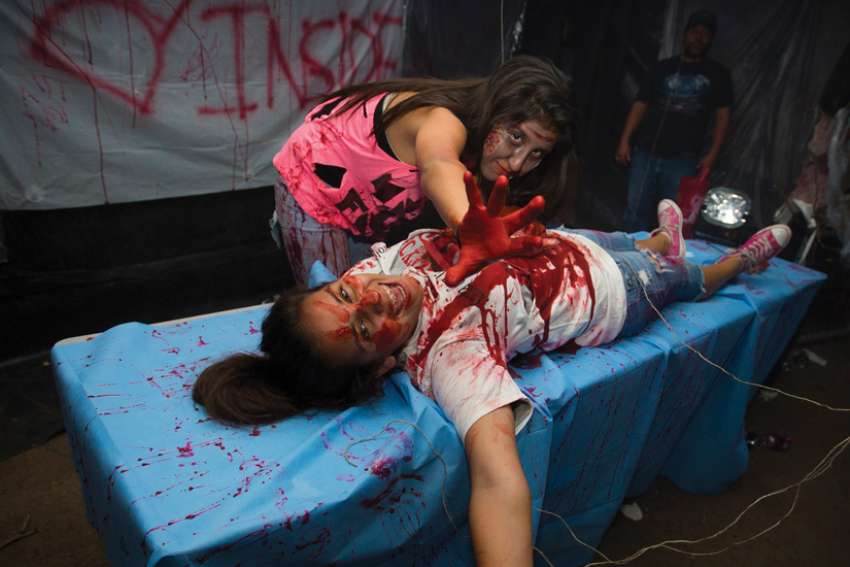The much-touted celebration is passed off as being lighthearted fun, a chance to dress up in funny costumes, collect candy and, for the older ones in the crowd, an opportunity to see the cute children in their neighbourhood.
But Halloween symbolizes much more than that. Oct. 31 shines the spotlight on a long-running, disturbing trend: our society’s glorification of, and fascination with, evil.
Modern-day Halloween stems from Samhain, a pagan festival celebrated by the Celts in ancient Britain and Ireland to mark the start of winter. It was believed that, for a few days around the equivalent of our Nov. 1, the boundary between the living and the dead was very thin, allowing the souls of the dead to return and those who died recently to enter the world beyond.
Encyclopedia Britannica notes that people lit fires to scare away evil spirits, made sacrifices to appease the evil spirits and “sometimes wore masks and other disguises to avoid being recognized by the ghosts thought to be present. It was in those ways that beings such as witches, hobgoblins, fairies and demons came to be associated with the day.” Divination, particularly in the areas of marriage, health and death, also occurred during this time.
The jack-o’-lantern carved pumpkin originates from a legend in which a drunkard named Jack was unable to enter Heaven or hell when he died, so he fashioned a lantern from a blazing coal in a turnip to guide him as he was doomed to wander about without a final resting place.
In our secular society, there are few such ancient beliefs and practices still alive today. Somehow, the origins of Halloween have endured, morphing into a contemporary Halloween that the National Retail Federation projects will be a $10.1-billion industry in the U.S. this year.
Why is this so?
Halloween thrives in a culture that glorifies evil. We are fascinated, aroused, captivated by demonic figures we encounter in popular movies, books and TV shows, many of which are aimed at young audiences.
Witness the huge success of The Twilight Saga, a movie series based on books that chronicle the adventures of a human who falls in love with, and eventually marries, a vampire.
Zombies, too, are very much in fashion, with hit movies like World War Z and the TV series The Walking Dead.Evil characters aren’t just supernatural. There’s an astounding amount of programming that focusses on murder, rape and other crimes, shown with such brutal, gory detail as to cause trauma just by watching it.
We’re repelled — but drawn. There are many theories of why this is so. Commentators have suggested a desire to connect with humanity, escape from real-life stresses, be fearless, learn to survive, among others.
In contrast, entertainment focusing on love, self-sacrifice, strong families and other Christian values is often rejected as being unrealistic, Pollyannaish or boring.
In many plot lines, evil characters, whether they be supernatural or human, have interesting, appealing traits. In the Twilight movie and book series, vampires are physically beautiful and sensitive.
The danger with such sympathetic characters and an overexposure to violent crime entertainment is that we are becoming de-sensitized to evil. We’re used to violence — it’s no longer shocking. Evil becomes a mainstay of fantasy entertainment.
We’re increasingly less able to discern evil. Halloween transforms evil characters into harmless cartoon figures. Unlike our ancient ancestors, we’re losing our fear of evil — and that is very dangerous.
The Gospels repeatedly warn us that evil is real. Jesus and the apostles cast out many demons that were causing great torment. We’re taught that Satan is the father of all lies, the great deceiver who entices people to the eternal lake of fire.
We fear evil because it takes us away from Christ, but, unlike our ancient ancestors, we no longer need be afraid of evil spirits, demons or ghosts. Jesus’ death on the cross has made us “more than conquerors,” especially in the spiritual realm. We don’t need to make sacrifices or disguise ourselves in costumes to avoid evil spirits.
(Majtenyi is a public relations officer who specializes in research at an Ontario university.)


